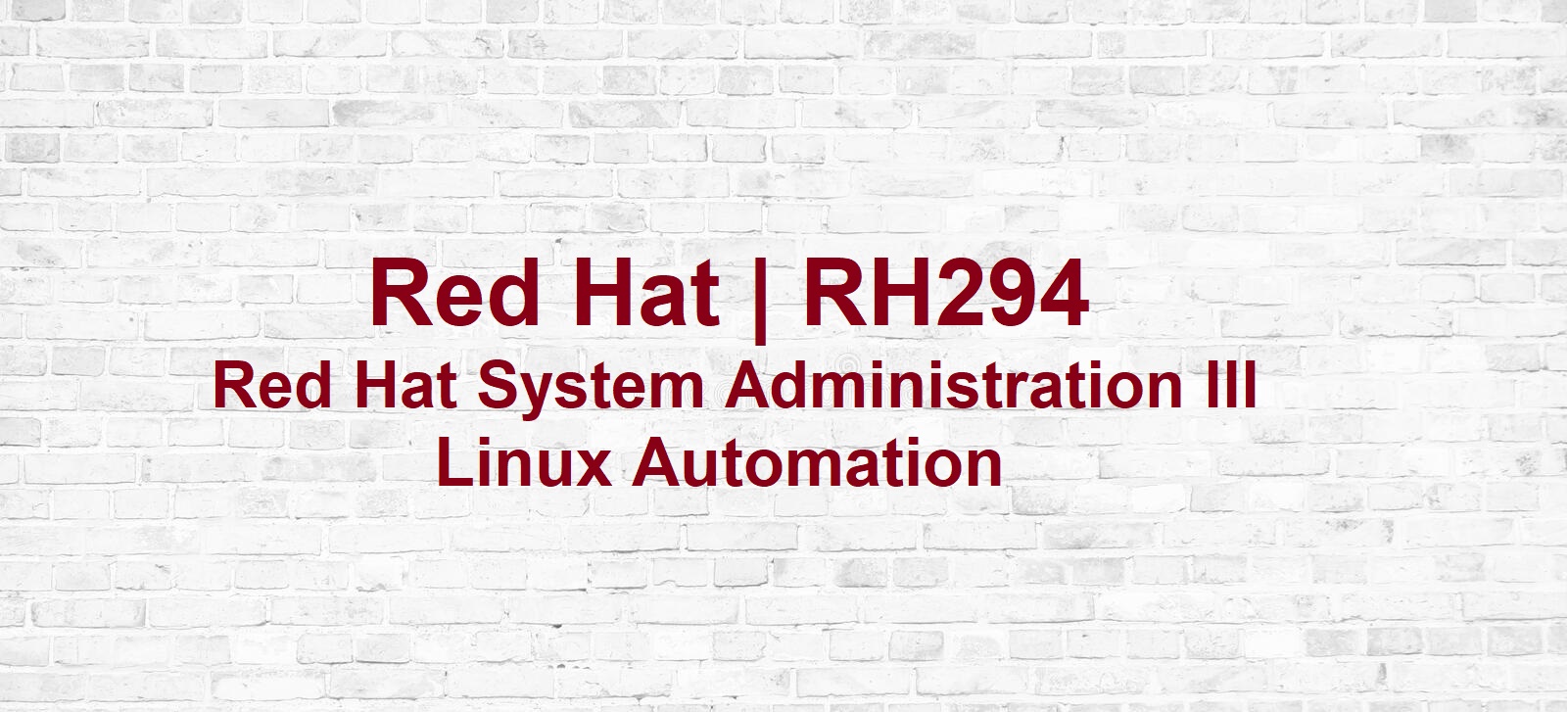Red Hat System Administration III: Linux Automation (RH294) for Linux system administrators and developers who need to automate provisioning, configuration, application deployment, and orchestration.
Students will learn how to install and configure Ansible on a management workstation and prepare managed hosts for automation. Students will write Ansible Playbooks to automate tasks and run them to ensure servers are correctly deployed and configured. Examples of approaches to automate common Linux system administration tasks will be explored.
Audience
Linux system administrators, DevOps engineers, infrastructure automation engineers, and systems design engineers responsible for automation of configuration management, consistent and repeatable application deployment, provisioning and deployment of development, testing, and production servers, and integration with DevOps CI/CD workflows.
Ansible Online Training Course Content 30 hours
1, Introducing Ansible
- Automating Linux Administration with Ansible
- Installing Ansible
- Installing Ansible on RHEL 8
- Installing Ansible on CentOS
- Installing Ansible on Ubuntu
2, Deploying Ansible
- Building an Ansible Inventory
- Managing Ansible Configuration Files
- Running Ad Hoc Commands
3, Implementing Playbooks
- Writing and Running Playbooks
- Creating your first Ansible playbook
- Implementing Multiple Plays
- Running multiple plays with Ansible Playbook
- Verifying your playbooks
- Re-using tasks and playbooks
- Running selective tasks and plays
4, Managing Variables
- Working with variables
- Defining and referencing variables
- Including external variables
- Setting host and group variables
- Understanding variable precedence
5, Managing Secrets using Ansible Vault
- Creating encrypted files
- Decrypting encrypted files
- Changing an encrypted file’s password
- Decrypting content at run time in playbooks
6, Managing Facts
- Gathering and showing facts
- Creating customs facts
- Capturing output with registers
7, Implementing Task Control
- Writing Loops and Conditional Tasks
- Implementing Handlers
- Handling Task Failure
8, Deploying Files to Managed Hosts
- Modifying and Copying Files to Hosts
- Deploying Custom Files with Jinja2 Templates
- Lab: Deploying Files to Managed Hosts
9, Managing Large Projects
- Selecting Hosts with Host Patterns
- Managing Dynamic Inventories
- Configuring Parallelism
- Including and Importing Files
10, Simplifying Playbooks with Roles
- Describing Role Structure
- Reusing Content with System Roles
- Creating Roles
- Deploying Roles with Ansible Galaxy
11, RHEL System Roles
- Installing RHEL System Roles
- Using RHEL SELinux System Role
- Using RHEL Time Sync System Role
12, Troubleshooting Ansible
- Troubleshooting Playbooks
- Troubleshooting Ansible Managed Hosts
- Enable Ansible logging
- Using the debug module
- Using the assert module
- Running playbooks in check mode
- Troubleshooting connectivity problems
- Using ping module to test connectivity
- Testing Connectivity to webservices endpoints
Red Hat System Administration III: Linux Automation (RH294) for Linux system administrators and developers who need to automate provisioning, configuration, application deployment, and orchestration.
Students will learn how to install and configure Ansible on a management workstation and prepare managed hosts for automation. Students will write Ansible Playbooks to automate tasks and run them to ensure servers are correctly deployed and configured. Examples of approaches to automate common Linux system administration tasks will be explored.
Audience
Linux system administrators, DevOps engineers, infrastructure automation engineers, and systems design engineers responsible for automation of configuration management, consistent and repeatable application deployment, provisioning and deployment of development, testing, and production servers, and integration with DevOps CI/CD workflows.
Ansible Online Training Course Content 30 hours
1, Introducing Ansible
- Automating Linux Administration with Ansible
- Installing Ansible
- Installing Ansible on RHEL 8
- Installing Ansible on CentOS
- Installing Ansible on Ubuntu
2, Deploying Ansible
- Building an Ansible Inventory
- Managing Ansible Configuration Files
- Running Ad Hoc Commands
3, Implementing Playbooks
- Writing and Running Playbooks
- Creating your first Ansible playbook
- Implementing Multiple Plays
- Running multiple plays with Ansible Playbook
- Verifying your playbooks
- Re-using tasks and playbooks
- Running selective tasks and plays
4, Managing Variables
- Working with variables
- Defining and referencing variables
- Including external variables
- Setting host and group variables
- Understanding variable precedence
5, Managing Secrets using Ansible Vault
- Creating encrypted files
- Decrypting encrypted files
- Changing an encrypted file’s password
- Decrypting content at run time in playbooks
6, Managing Facts
- Gathering and showing facts
- Creating customs facts
- Capturing output with registers
7, Implementing Task Control
- Writing Loops and Conditional Tasks
- Implementing Handlers
- Handling Task Failure
8, Deploying Files to Managed Hosts
- Modifying and Copying Files to Hosts
- Deploying Custom Files with Jinja2 Templates
- Lab: Deploying Files to Managed Hosts
9, Managing Large Projects
- Selecting Hosts with Host Patterns
- Managing Dynamic Inventories
- Configuring Parallelism
- Including and Importing Files
10, Simplifying Playbooks with Roles
- Describing Role Structure
- Reusing Content with System Roles
- Creating Roles
- Deploying Roles with Ansible Galaxy
11, RHEL System Roles
- Installing RHEL System Roles
- Using RHEL SELinux System Role
- Using RHEL Time Sync System Role
12, Troubleshooting Ansible
- Troubleshooting Playbooks
- Troubleshooting Ansible Managed Hosts
- Enable Ansible logging
- Using the debug module
- Using the assert module
- Running playbooks in check mode
- Troubleshooting connectivity problems
- Using ping module to test connectivity
- Testing Connectivity to webservices endpoints
